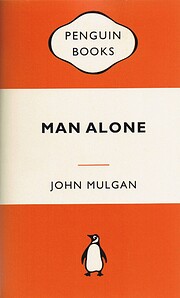

Click on a thumbnail to go to Google Books.
|
Loading... Man alone (original 1939; edition 2010)by John MulganThis is a one of New Zealand's classic novels, and I must admit I had never heard of it until I watched a segment on our local books TV show 'The Good Word' earlier this year. I immediately wanted to read it and now that I have I can understand the influence the novel has had on many New Zealand writers since. I think this book resonated for me because it had such a strong New Zealand flavour to it that just rang true and the story didn't overwhelm the setting. Johnson has served in the Great War and now feels restless and disenchanted with what England is offering so he decides to take a ship to New Zealand, he's heard that a man can find his place there. He’s in his 20s and arrives in New Zealand with little in the way of funds but manages to find a little work as he drifts from job to job around the country. As the depression sets in the jobs start to dry up and Johnson finds himself in a workcamp for the unemployed. Johnson is willing to put up with whatever life throws at him, he’s not dynamic or going to change, he’s alone in a world that isn’t ever going to offer him anything. In spite of all this bleakness, which is all that the depression years offered a lot of men, he keeps going. By the end of the novel Johnson is a volunteer in the Spanish Civil War. Mulgan writes about a man who is loyal but friendless, a worker but with no job, no ambition, a drifter through life. A man who has fought as a soldier and come home to indifference. Through the life of Johnson we see the ordinary man and ordinary New Zealand of the 1930s and it isn’t pretty. There is no hope, no future, no money, no time for outsiders, strangers, unwelcoming, inward looking. This is a political novel about the alienated man, survivor of the trenches. By reading about the life of Johnson, one can consider how social policy worked against him and others of his kind. As a student at Auckland University Mulgan had volunteered as a special constable charged with keeping order when the unemployed held rallies and rioted in 1932. His encounters with the unemployed changed his political thinking. He wrote the novel in the late 1930s when he was living in the UK after studying at Oxford. His life has been written about several times and quite a mythology has arisen around it. From his biographer Vincent O’Sullivan - We continue to read Man Alone because there is no fiction that so accurately, so unsentimentally, looks at the kind of people we were, and that in some ways we still are. We’re not all that articulate. We don’t go much on ideas. We’re puzzled by the kind of society we want to be. Mulgan saw the Depression with a clearer eye than any of his contemporaries, and wasn’t interested in flattering us. The important thing to him as a novelist was to catch the facts of the time – a mean-spirited capitalism, a country without a sense of community, his Maori, as much as Pakeha, looked at dead straight. His title is almost always misinterpreted. He was not singing the praises of what we like to think a national characteristic, our ability to ‘go it alone’. Mulgan’s meaning was deliberately the reverse, a way to bring home what Hemingway meant in the sentence the title came from: ‘a man alone ain’t got no bloody chance’. Mulgan’s ideal was a society in which individuals were respected for themselves, and in which people shared their values as well as their assets. That is what his main character fights for in Spain at the end of the novel. The details of a political belief become less compelling with time. But what draws us back to Man Alone is its ring of truth. It remains the most accurate picture we have of what New Zealand was, not so very long, after all, before ourselves. |
Current DiscussionsNonePopular covers
 Google Books — Loading... Google Books — Loading...GenresMelvil Decimal System (DDC)823.2Literature English & Old English literatures English fiction 1400-1558LC ClassificationRatingAverage: (3.76) (3.76)
Is this you?Become a LibraryThing Author. |